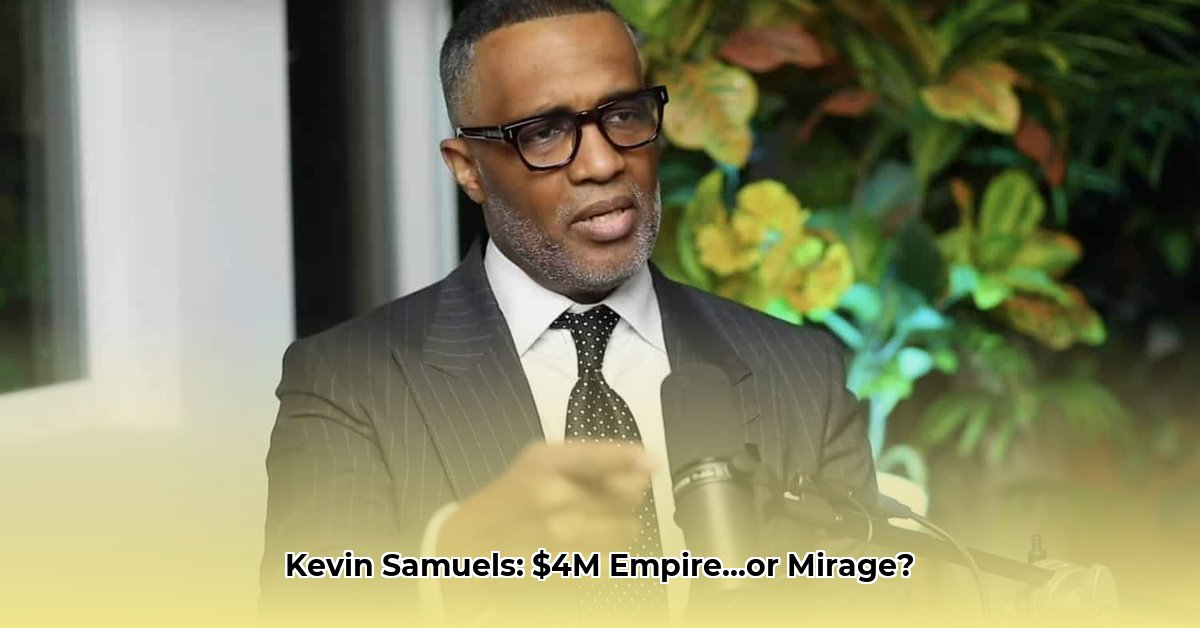
Kevin Samuels' sudden death at 57 left behind a complex legacy, including an estimated $4 million net worth. This article analyzes how he built his empire, examining his business strategies, the controversies that defined his brand, and the lessons learned for future creators and business professionals. His story underscores the intricate relationship between content creation, controversy, and brand building in the digital age.
Building a Multi-Million Dollar Brand: Beyond YouTube Fame
Samuels' financial success wasn't accidental; it was the result of a calculated strategy involving diverse income streams. His high-end image consulting, reportedly charging up to $10,000 per session, provided a significant revenue source. This high-ticket approach targeted a specific clientele seeking image enhancement and personal branding.
Further amplifying his earnings was his highly successful YouTube channel. Boasting over a million subscribers, the channel generated substantial income through ad revenue and sponsored content. Brands recognized the value of his large and engaged audience, leading to numerous lucrative partnerships. His impressive collection of luxury vehicles served as a visible symbol of his financial achievements.
The Two Sides of the Coin: Controversy and Financial Success
Samuels' considerable wealth was intrinsically linked to significant controversy. His often blunt and polarizing opinions on relationships sparked widespread debate and generated substantial media attention. While this fueled his popularity and viewership, it also attracted considerable criticism and ethical questions. The extent to which controversy was instrumental to his financial success, or a potentially damaging risk, remains a key discussion point among business experts and influencers. Did his controversial views amplify his reach, or did they ultimately limit his brand's long-term viability?
Unraveling the Financial Puzzle: Income, Expenses, and Unknowns
While the $4 million net worth estimate is credible, precise financial details remain scarce. Primary income sources—image consulting, YouTube earnings, sponsored content, and brand deals—are confirmed, but precise figures aren't publicly available. Furthermore, operating costs, taxes, and legal expenses are largely undisclosed, hindering a complete financial picture. This lack of transparency highlights the challenges in obtaining a true snapshot of even seemingly public figures' finances.
After His Passing: The Complexities of a Post-Mortem Brand
Samuels' unexpected death introduced further complexities. Managing a controversial brand posthumously presents significant challenges, particularly concerning the estate's handling, intellectual property rights, and online presence. The decisions made directly affect his legacy and future revenue generation. This situation underscores the long-term implications of building a brand closely tied to a single, potentially controversial figure.
Lessons Learned: Building a Sustainable Online Empire
Samuels' career offers valuable—and cautionary—lessons for online entrepreneurs. His success showcases the power of niche marketing and strategic monetization. However, the ethical implications of employing provocative content are equally crucial. The significant income potential of controversial methods comes with the substantial risk of reputational damage, a risk further amplified after his death. Diversifying income streams and professionally managing one's brand are paramount for long-term success in the dynamic digital landscape.
How to Ethically Monetize Controversial Online Content: Lessons from Kevin Samuels
Key Takeaways:
- Samuels's $4 million net worth highlights the financial potential of controversial online content.
- His story underscores the importance of ethical considerations when monetizing such content.
- The case study reveals the potential risks of relying solely on controversial content for financial success.
Navigating the Ethical Tightrope: Monetizing Without Compromise
Samuels's experience raises critical questions regarding ethically monetizing controversial content. How can creators use provocative material without harming their brand or moral compass? The answer requires a multi-faceted approach.
Strategies for Ethical Monetization:
- Diversify Revenue Streams: Don't rely solely on controversial content. Explore diverse income avenues like merchandise, carefully selected sponsorships, and courses unrelated to contentious topics.
- Prioritize Ethical Considerations: Assess potential negative impacts. Does the content promote harmful stereotypes or incite hatred? If so, adapt your approach. Profit shouldn't outweigh ethical responsibilities.
- Engage in Constructive Dialogue: Foster a community that values respectful debate, even amidst differing viewpoints. Respond to criticism constructively, showing willingness to learn and grow.
- Transparency and Accountability: Publicly acknowledge the potential downsides and be explicit about your intentions. Demonstrate a commitment to accountability and responsible content creation.
- Self-Reflection and Refinement: Continuously evaluate your content and its impact. Adjust your strategy to align with your values while achieving your goals.
The Role of Platforms and Brands
The success of controversial influencers necessitates a discussion of platform and brand responsibilities. Platforms need clearer policies regarding harmful content, balancing free speech with responsible content moderation. Brands must carefully vet influencers to ensure alignment with their values.
Conclusion: A Legacy of Controversy and Lessons Learned
Kevin Samuels' legacy is complex, demonstrating both financial success and ethical challenges. His story serves as a case study in the potential and risks associated with controversial online content. By learning from his experience, creators can strive for impactful content without compromising ethical standards. The discussion surrounding his legacy continues to provide crucial insights into the evolving digital landscape.